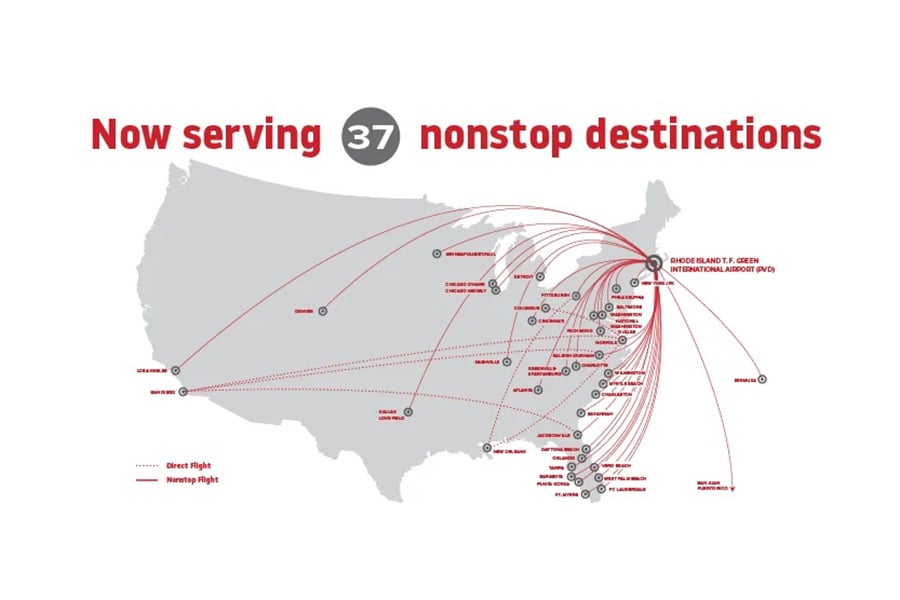Get to Know Three Local Animal Rescues Helping to Secure Furever Homes
Adopt don't shop this National Pet Day.

The Potter League for Animals provides shelter, veterinary care, behavior training, humane education and the opportunity for animals to find loving homes. Photography courtesy of the Potter League for Animals.
We’ve all heard the phrase ‘Adopt, don’t shop.’ As catchy and cutesy as it may sound, there’s real sentiment behind it: You’re doing good when supporting an altruistic organization whose main objective is to place animals with responsible owners. According to the Rhode Island Department of Environmental Management, there are more than 150 shelter-like facilities in the state, meaning there are plenty of potential pets to go around. We caught up with three of the top local rescues to learn how they’re making waves in the local pet adoption scene.
EAST
Potter League for Animals
Middletown
Oh, the power of women with a mission.
What started as a small operation to help “abandoned, sick, lame, overworked or cruelly treated animals” back in 1929 is now the largest shelter in the Ocean State, and one that’s celebrating its ninety-fifth anniversary this year.
Friends and animal advocates Virginia Potter, Mary van Beuren and Emma Norman opened the league’s first brick and mortar shelter on Newport’s Harrington Street in 1931. When Potter passed in 1958, her will stipulated that the league be renamed after her late husband, Robert Potter.
The Potter League for Animals relocated to Middletown in 1978 when the original shelter no longer met its needs. Thirty years later, it upgraded the space to an environmentally friendly, state-of-the-art facility and education resource center. By fall of 2009, it had become the first animal shelter in the country to receive LEED Gold certification from the U.S. Green Building Council.

The Potter League for Animals facility received LEED Gold certification from the U.S. Green Building Council in 2009. Photography courtesy of the Potter League for Animals.
But while it may have started on the east side of the bay, the shelter has since expanded its reach statewide. In 2019, the league took over the Rhode Island Community Spay and Neuter Clinic, Rhode Island’s leading spay and neuter service provider, in Warwick and renamed it the Potter League Spay and Neuter Clinic. The next year, it acquired the Pets in Need Veterinary Clinic in East Providence, which provides affordable veterinary care to families receiving public assistance.

The Potter League offers veterinary care to families receiving public assistance. Photography courtesy of the Potter League for Animals.
In all, the Potter League provided services to more than 15,000 animals in some capacity last year, says Director of Marketing and Community Relations Kara Montalbano.
“And of course, we want to help animals that come in and stay at the shelter, but we also want to keep pets out of our shelter and keep families together,” says Montalbano. “That’s a huge part of our strategic movement and planning, be it through our low-cost veterinary care, our vaccination clinics, pet food pantry, our pet safe program [temporary hosting while owners get back on their feet] or working with the Women’s Resource Center to help make it the first women’s shelter in the state with pet-friendly accommodations.”

The Potter League for Animals brings in cats, dogs and “pocket pets” for adoption. Photography courtesy of the Potter League for Animals.
The Potter League also works with local animal control agencies and municipal shelters to bring in cats, dogs, “pocket pets” like guinea pigs and rabbits, reptiles like iguanas and turtles, and birds (even the occasional goat, chicken, pig or peacock) to the Middletown facility and address any medical needs while they wait to be adopted.
Once the right match has been made, shelter workers follow up with post-adoption resources, including the number for their free behavior health helpline that adopters can consult should they have any questions, and free adopted-dog training classes on Sundays.
“We really try to support the adopter through every step of the process,” Montalbano says.
On April 5, the league will hold its fiftieth annual LoveBash for Animals gala, which raises funds for the animal shelter and its programs. Potter League Animal Care & Adoption Center, 87 Oliphant Lane, Middletown, 846-8276, potterleague.org
_______________________
NORTH
RISPCA
Warwick
Rhode Island’s oldest — and the country’s third-oldest — nonprofit animal welfare organization came about because of horses.
“Owners were beating their horses in the streets of downtown Providence for not pulling their carriages fast enough, and it was in such plain view that people were making complaints,” says Stephanie Van Patten, RISPCA’s director of community engagement.
In response, the Rhode Island Legislature created the Rhode Island Society for the Prevention of Cruelty to Animals in 1870.
And though the society had a large presence in Newport during its early days, the capital city’s Fountain Street location eventually became the base for its first shelter in the 1930s, addressing the needs of both horses
and other animals. It moved to East Providence fifty years later, finally settling in its spacious Warwick digs last September.
The new building has a classroom that can host animal education programs and summer camps, which all revolve around teaching and fostering compassion toward animals, adds Megan Yaffe, the society’s director of operations.
The dog kennels also saw a major upgrade, with all thirty-eight state-of-the-art enclosures boasting nearly double the space
of the old ones. A walk around the facility
reveals an enrichment space for the dogs to run around and enjoy, a cat room complete with its own lounge area, a room for small critters, temporary pet lodgings, an employee cafeteria and more.
Many of the animals in its care come from owner surrenders, but many are also seized from cruelty situations, Yaffe says.
The RISPCA is the only nonprofit animal rescue organization in the state that investigates cases of animal cruelty and neglect. It takes on thousands of complaints from the public each year and can advise on the best course of action, whether that means independently probing or getting other agencies — like local animal control officers or police departments — involved.
Caring for animals is expensive; dogs alone cost the organization at least $56 a day, says Wayne M. Kezirian, the society’s president and general agent. As a nonprofit, the RISPCA relies entirely on public generosity to sustain the operation. As such, it’s gotten creative with its fundraising efforts.
Its February “Love Stinks” campaign, for example, let people get back at their exes by sending in their names, which were then placed in kitty litter boxes for $5 a pop. It raised more than $8,000 with 1,100 “retripootions” and got tons of press coverage, according to a Facebook post.
If you want to keep the help coming — whether through adopting, volunteering, keeping the pet food pantry stocked or donating — be sure to go directly to RISPCA’s website and socials for more information. While the name might be similar, the group is not associated with the American Society for the Prevention of Cruelty to Animals.
“We get a lot of people thinking they’re donating to us when they’re actually donating to the national society,” says Kezirian. “If we had all that help coming our way instead, I think we’d be in pretty good shape!” Rhode Island SPCA, 155 Plan Way, Warwick, 383-1900, rispca.org
_______________________
SOUTH
Save One Soul Animal Rescue League
Wakefield
Save One Soul isn’t your traditional dog shelter with rows of kennels. The organization is purely foster-based, meaning all pets are placed with temporary caretakers before they find their forever homes.
Still, it has a brick and mortar: a quaint shop in Wakefield stocked with colorful toys, leashes, chews and more. During my visit I get to cuddle with a sweet, mixed-breed pup named Shea Butter. She, like many of the shelter’s animals, is from the South.
“There are unfortunately way too many animals down there that need help,” says owner and founder Emma Dawley. When asked why that is, she speculates, “There’s a lot of different factors, but one may be that spay/neuter is not as popular, and people are more spread out; there aren’t many cheap options close by.”
For someone who was afraid of dogs growing up, Dawley is now very familiar with the world of dog adoption. She and her husband loved their first rescue, Louie, so much they were inspired to get him a buddy. Their second dog, Layla, died after only a short time with the family, and they were inspired to volunteer with a local pet shelter in her memory.
That led Dawley to co-found SOS in 2014. She and her business partner continued working with Southern partners they met as volunteers, and started fostering animals in their own homes. From there, they attracted like-minded volunteers, fosters and benefactors to help them grow their mission over time — and grown it has.
“Back then, adoption events were not as prevalent as they are now,” Dawley says. “When I was with the other rescue group, adoption events would have five dogs, and maybe one would get adopted. But just a couple weeks ago we held an event with about forty dogs and seventeen went home.”
The first step in adopting a pet from SOS is filling out an online application.
“We’re not looking for the absolute most perfect home, because that means we would only be able to save two or three dogs a year, but we like to think that our quality standards are very high,” Dawley says. “At the same time, we also like to trust that people are good.”
If you can’t commit to an adoption, there are other ways to help. SOS is 100 percent volunteer-driven, including adoption counselors, adoption event coordinators, administration roles, data collectors, foster coordinators and so on.
And, of course, there are the fosters themselves. Onboarding is like the adoption process, if not a little more extensive to ensure the potential foster can accommodate a variety of dog personalities and breeds. Once approved, the organization takes care of all dietary and veterinary needs — you just need to provide the roof and cuddles while they wait for their match.
If you’re wondering how the nonprofit can afford everything on an entirely volunteer-run budget, that’s where the shop comes in. In addition to pet products, the space also hosts a dog grooming section and training facilities — but it’s also so much more than a financial source.
“It’s a way for us to interact and engage with the community at large and promote resources for responsible pet guardianship,” Dawley says. “It’s been just great all the way around.” Save One Soul Animal Rescue League, P.O. Box 498, Wakefield, sosarl.org; Save One Soul Retail, 577 Kingstown Rd., Wakefield, RI, 360-2258, sosretailri.com

































